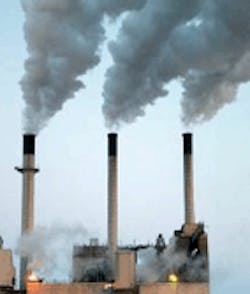EPA Announces Rule to Reduce Mercury Emissions from Power Plants
Yesterday, Acting Administrator Steve Johnson signed the Clean Air Mercury Rule, which will significantly reduce mercury emissions from coal-fired power plants across the country -- mercury which eventually settles and builds up in waterways.
Taken together, the recently issued Clean Air Interstate Rule and the new Clean Air Mercury Rule will reduce electric utility mercury emissions by nearly 70 percent from 1999 levels when fully implemented. "This rule marks the first time the United States has regulated mercury emissions from power plants," Acting Administrator Steve Johnson said. "In so doing, we become the first nation in the world to address this remaining source of mercury pollution."
The Clean Air Mercury Rule will require reductions at our largest remaining source of human-generated mercury emissions, electric utilities. Mercury is a persistent, toxic pollutant that accumulates in the food chain. While concentrations of mercury in the air are usually low, mercury emissions can reach lakes, rivers and estuaries and eventually build up in fish tissue. Americans are exposed to mercury primarily by eating certain species of fish. Fish and shellfish are an important part of a healthy diet.
However, pregnant women, women of childbearing age, nursing mothers and young children should avoid certain types of fish that are high in mercury.
Johnson noted that close to 80 percent of the fish Americans buy comes from overseas, from other countries and from waters beyond our reach and control. The United States contributes just a small percentage of human -- caused mercury emissions worldwide -- roughly three percent with U.S. utilities responsible for about one percent of that.
"Airborne mercury knows no boundaries; it is a global problem. Until global mercury emissions can be reduced -- and more importantly, until mercury concentrations in fish caught and sold globally are reduced -- it is very important for women of child-bearing age to pay attention to the advisory issued by EPA and FDA, avoiding certain types of fish and limiting their consumption of other types of fish," Johnson added.
Today's rule limits mercury emissions from new and existing coal-fired power plants, and creates a market-based cap-and-trade program that will permanently cap utility mercury emissions in two phases: the first phase cap is 38 tons beginning in 2010, with a final cap set at 15 tons beginning in 2018.
These mandatory declining caps, coupled with significant penalties for noncompliance, will ensure that mercury reduction requirements are achieved and sustained.
The cap-and-trade system established under today's rule also creates incentives for continued development and testing of promising mercury control technologies that are efficient and effective, and that could later be used in other parts of the world. In addition, by making mercury emissions a tradable commodity, the system provides a strong motivation for some utilities to make early emission reductions and for continuous improvements in control technologies.
"We remain committed to working with Congress to help advance the President's Clear Skies legislation in order to achieve greater certainty and nationwide emissions reductions," said Steve Johnson. "But we need regulations in place now."
Source: EPA
